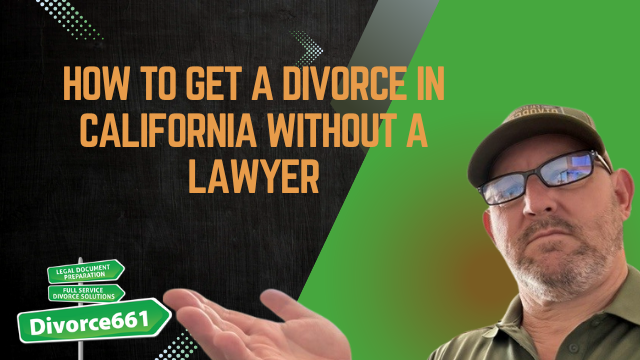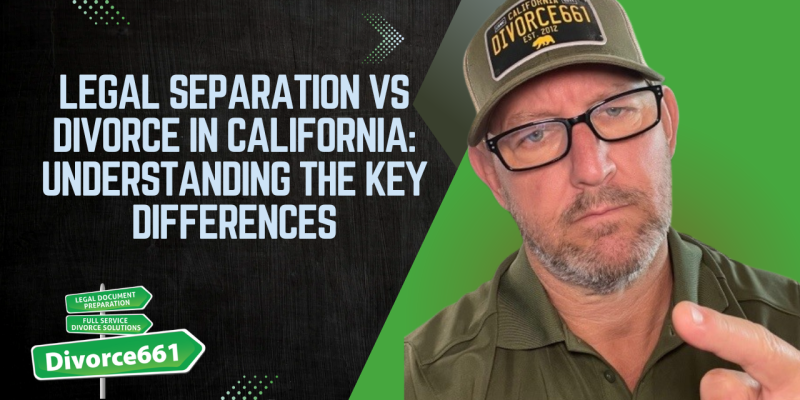How To Get A Divorce In California Without A Lawyer
Divorce can be a challenging and costly process, but what if you could navigate it without the hefty fees of an attorney? Many people don’t realize that in California, you are not required to have a lawyer to finalize your divorce. You can represent yourself, known legally as proceeding “in pro per,” and successfully complete the divorce process on your own.
My name is Tim Blankenship, and through my service at Divorce661, I help individuals across California manage their divorces without the need for expensive legal representation. In this article, I’ll walk you through what it means to get a divorce without a lawyer, how self-representation works, and how services like ours can assist you in a cost-effective and amicable way.
Understanding Divorce Without a Lawyer in California
Many people assume that hiring a lawyer is mandatory when filing for divorce, but that’s simply not the case in California. You have the option to represent yourself throughout the entire process. This is called going “in pro per,” which means you are self-represented. You can file the necessary paperwork, attend court hearings, and finalize your divorce without ever hiring an attorney.
While this may sound intimidating, thousands of Californians successfully complete their divorces on their own every year. The key is having the right guidance and resources to help you understand the steps and paperwork involved.
Why Choose to Represent Yourself?
- Cost savings: Attorney retainers in California typically start at around $5,000, even for uncontested divorces. This can be a significant financial burden for many families.
- Control: Representing yourself gives you direct control over your case without relying on a third party.
- Simplicity: Many divorces, especially uncontested ones, follow a straightforward process that you can manage with the right preparation.
How a Legal Document Preparation Service Can Help
If the idea of handling your divorce entirely on your own feels overwhelming, there’s a middle ground. Services like Divorce661 provide legal document preparation and guidance without acting as your attorney. This means you remain unrepresented but benefit from expert assistance in preparing accurate court documents and understanding the process.
We do not represent either party in the divorce — our role is to help you and your spouse navigate the paperwork and procedural requirements as smoothly as possible. This approach is both cost-effective and efficient, especially if you and your spouse are on amicable terms.
Affordable and Accessible Support
Our fees start at $699, a fraction of what many attorneys charge. Whether your divorce is uncontested or you simply want to avoid the high costs of legal representation, services like ours can help you finalize your divorce anywhere in California. We work with all California courts and handle 20 to 30 divorce cases each month, so you can be confident that you’re in experienced hands.
Steps to Get a Divorce in California Without a Lawyer
- File the initial divorce petition: This is the official start of your divorce case.
- Serve your spouse: You must legally notify your spouse by serving them with the divorce papers.
- Complete financial disclosures: Both parties disclose assets, debts, and income.
- Negotiate terms: If uncontested, you and your spouse agree on division of property, custody, and support.
- Submit final paperwork to the court: This includes your marital settlement agreement and judgment forms.
- Attend court hearings if necessary: Some cases may require a brief court appearance, but many can be finalized without it.
While these steps may seem technical, having proper document preparation and guidance can make the process straightforward and manageable without a lawyer.
Need Help? Reach Out for a Consultation
If you’re considering getting through your California divorce without an attorney but want professional help to ensure everything is done correctly, feel free to contact me. At Divorce661, I’m happy to discuss how we can assist you in navigating the divorce process efficiently and affordably.
You can call us at 661-281-0266 or book a consultation online at divorce661.com. Our goal is to help you and your spouse move forward amicably and with confidence.
Conclusion
Getting a divorce in California without a lawyer is not only possible but can be a smart choice for many couples looking to save money and maintain control over their case. With the right preparation and support, you can successfully navigate the divorce process on your own or with the help of a legal document preparation service.
Remember, you don’t have to face this challenging time alone, and affordable assistance is available to help you every step of the way.
Wishing you the best on your journey toward a fresh start.




